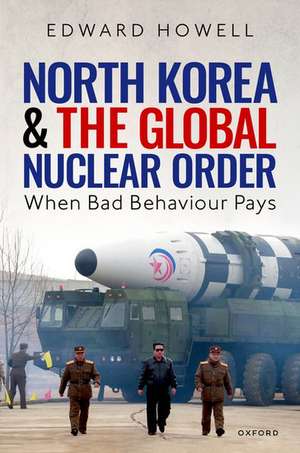North Korea and the Global Nuclear Order: When Bad Behaviour Pays
Autor Edward Howellen Limba Engleză Hardback – 18 mai 2023
Preț: 501.09 lei
Preț vechi: 715.66 lei
-30% Nou
Puncte Express: 752
Preț estimativ în valută:
95.90€ • 99.75$ • 79.17£
95.90€ • 99.75$ • 79.17£
Carte tipărită la comandă
Livrare economică 03-09 aprilie
Preluare comenzi: 021 569.72.76
Specificații
ISBN-13: 9780192888327
ISBN-10: 0192888323
Pagini: 316
Dimensiuni: 161 x 240 x 26 mm
Greutate: 0.64 kg
Editura: OUP OXFORD
Colecția OUP Oxford
Locul publicării:Oxford, United Kingdom
ISBN-10: 0192888323
Pagini: 316
Dimensiuni: 161 x 240 x 26 mm
Greutate: 0.64 kg
Editura: OUP OXFORD
Colecția OUP Oxford
Locul publicării:Oxford, United Kingdom
Recenzii
Thoughtful, well-argued, judiciously structured, elegantly written and empirically well-supported, Howell makes an innovative contribution by introducing the concept of "strategic delinquency" to explore how North Korea has sought to use a three-fold pattern of actions, including provocations, norm-transgression, and deception, to advance its long-term goal of becoming a de-facto nuclear power.
Drawing on interviews and documentary evidence, Edward Howell provides a sober and sobering account of the cumulative failures of international diplomacy to prevent North Korea from developing nuclear weapons. He shows that not only has North Korea's delinquency benefitted its illicit weapons programmes but that, through the regime-state's pursuit of status, it also threatens to undermine the established principles of global nuclear order. I recommend North Korea and the Global Nuclear Order as a clear introduction for anyone new to the subject matter, and as a source of new insight for those for whom these issues are already painfully familiar.
In North Korea and the Global Nuclear Order, a sober study of Pyongyang's pursuit of nuclear weapons since the end of the Cold War,...Howell neatly sums up in his subtitle the lesson Kim has learnt from his first decade in power: "bad behaviour pays"
This excellent book makes a unique contribution to the literature on the North Korean nuclear weapons program. The issue has attracted a lot of scholarly attention since North Korea acquired the capability to hit the continental United States with an intercontinental ballistic missile in 2017.
North Korea & the Global Nuclear Order traces the history of the North's nuclear program and its negotiations with the United States. Howell describes North Korea's stratagem as "strategic delinquency" and asks "how North Korea has become a nuclear-armed state and how we might account for its behavior over the past thirty years?"
Drawing on interviews and documentary evidence, Edward Howell provides a sober and sobering account of the cumulative failures of international diplomacy to prevent North Korea from developing nuclear weapons. He shows that not only has North Korea's delinquency benefitted its illicit weapons programmes but that, through the regime-state's pursuit of status, it also threatens to undermine the established principles of global nuclear order. I recommend North Korea and the Global Nuclear Order as a clear introduction for anyone new to the subject matter, and as a source of new insight for those for whom these issues are already painfully familiar.
In North Korea and the Global Nuclear Order, a sober study of Pyongyang's pursuit of nuclear weapons since the end of the Cold War,...Howell neatly sums up in his subtitle the lesson Kim has learnt from his first decade in power: "bad behaviour pays"
This excellent book makes a unique contribution to the literature on the North Korean nuclear weapons program. The issue has attracted a lot of scholarly attention since North Korea acquired the capability to hit the continental United States with an intercontinental ballistic missile in 2017.
North Korea & the Global Nuclear Order traces the history of the North's nuclear program and its negotiations with the United States. Howell describes North Korea's stratagem as "strategic delinquency" and asks "how North Korea has become a nuclear-armed state and how we might account for its behavior over the past thirty years?"
Notă biografică
Edward Howell is a lecturer in Politics at New College, University of Oxford. His research concerns the international relations of East Asia, with a focus on the Korean Peninsula. He has been a contributing writer for the Economist Intelligence Unit, a Korea Foundation-Next Generation Policy Fellow at Chatham House, London, and an Emerging Leaders Fellow of the Ministry of Unification of the Republic of Korea. Edward also offers extensive media analysis on the international relations of East Asia, including for The Spectator, the Daily Telegraph, and BBC World News.
